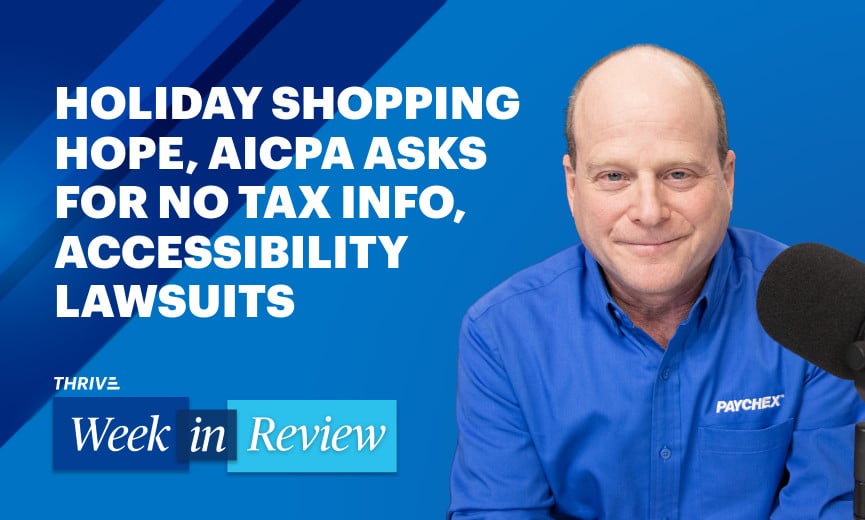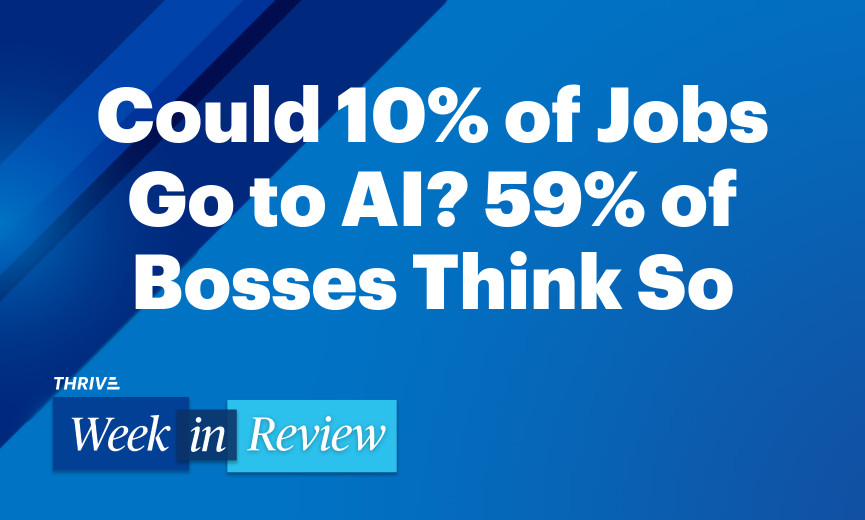- Thrive
-
Season
5Episode27
Executive Orders: Business Leaders Get Questions Answered
Podcast •
Watch
Summary
Employers and other business representatives who attended a recent Paychex webinar – “The First 100 Days: Business Strategies to Adapt Quickly” – posed questions that time did not permit the guests to answer. Host Gene Marks, who moderated the event, is using this episode of the podcast to offer advice he provides to his clients. He addresses federal Executive Orders on DEI, tackling “gender vs. sex” in handbooks, company-sponsored programs for underrepresented communities such as women in business, preferred gender pronouns, equal opportunity employment, and more.
View Transcript
Hey everybody, it's Gene Marks, and welcome to a special episode of the Week in Review, a Paychex THRIVE podcast. You know that usually we do this every week: We take a few headlines out of the news, and we talk about it because they've affected your small business and my small business.
Well, this week we're going to do something a little bit different. We just did a great webinar – “The First Hundred Days: Business Strategies to Adapt Quickly” – that was attended by thousands of people. This episode of the Week in Review, we're going to dedicate to this: There were questions that came up during this webinar and we didn't have time to get to these questions. So, what I wanted to do during this Week in Review episode is address some of the questions and hopefully bring some clarity and answers for you.
Now, a couple caveats. Number one is some of the biggest complaints about these executive orders and the rules that have come out even from the EEOC and the Department of Justice is that there's still not a lot of clarity on some of these things. So, some of the answers I provide are based on my best judgment, which gets me to number two.
This is me. I'm going to give you my thoughts, my answers to some of these questions, what I'm telling my clients. Just want you to know this is not a Paychex thing. This is not coming from Paychex legal or Paychex executives saying this is what you should do. All of these responses to these questions are Gene Marks and Gene Marks only. So, if you've got any issues with these responses or even if you find any area that you think you don't agree with me or whatever, by all means, feel free to reach out to me directly because that's certainly on me. Is that fair enough? All right.
So, let me let me go over some of these questions that came out, okay? One question that came out said this: Is it OK to still include on a job post that we are an equal opportunity employer? Is that still OK.?
The answer is of course it's still okay because hopefully you are an equal opportunity employer. What I'm telling my clients that are, you know, you're doing this to be in compliance with the law is that a lot of the DEI regulations and the executive orders they are they're designed to provide equal opportunity for all employees not just specific groups of employees or certain identities. It's supposed to be for everybody.
So, by saying you're an equal opportunity employer is completely fine and completely in accordance with all the DEI regulations and executive orders. So, that's completely fine.
Another question that came out, which is kind of similar, says about preferred gender pronouns. If we have a job post, do we include preferred gender pronouns in our job post, mainly by the person that's posting this? Or people say, like when we have signatures going out in our emails, should we stop including preferred gender pronouns?
No, you don't need to do that. There is no rule against that. There is no law against including it. If you feel that's something you want to continue including by all means you can continue to do that.
All right, let's go to another question. And again, these are my responses only and the advice that I'm giving my clients. The question is this: Based on these new executive orders, are we required to change “gender” to “sex” in our handbooks and policy? And the person that asked this question is noting specifically that we are non-federal.
And the answer is no, because you're non-federal. My advice to clients that if you are doing business with the federal government, if you are a federal contractor, if the federal government is your customer in any way, I think you do want to pay special attention to the terminology that you're using. And right now, one of the executive orders is saying we are going to change the word gender to sex, and the federal government is only recognizing two sexes, which is male and female.
So, again, as just a best practice and also just to sort of cover yourself, if you're doing business with the federal government, you want to make sure that you're doing the same thing. However, if not, you can keep the word gender in your communications.
All right, let's go to another question, shall we? Is there an explanation as to why veteran and disability remain untouched? And what that viewer of the webinar is probably referring to that in all these executive orders and all the new regulations, there's really very little said about veterans giving them special treatment or disabled people giving them special treatment, as well.
And there's reason for doing that. Veterans and disabled people are protected by certain laws that are on the books, not just regulations or orders, but certain laws. So, the executive orders really can't change a lot of that. So no, the reason why they really haven't been addressed, veterans and disabled people, in these executive orders is because there's only so far an executive order can do. It certainly can't overturn existing law, and that's the reason why.
Next, regarding DEI, what about company-sponsored programs that target underrepresented communities such as women or African Americans? Can we still do that? The answer is yeah. Now, you have to be careful, but the answer is yes. And in fact, if you look and Google around, you will see many companies – private companies, larger brands, as well – that are still offering programs directly to underrepresented communities.
You are certainly free to do that if you want to offer that kind of program. Now, it's different if you're the federal government or you're receiving taxpayer dollars or you're a university, for example, and changing your admissions. But, as a private company, you can still do programs for certain identity groups or underrepresented communities if you want to do that.
Just remember these rules they have to do with your hiring and your workplace practices not necessarily if you want to provide certain help to a certain group, and I always tell my clients what is the difference between having a grant program or a philanthropy program for African Americans or maybe having a program for people that were affected by a hurricane in a certain area right? I mean, you know, it's the same you're singling out a certain group of people and you're trying to help that certain group and as a private company you're certainly allowed to do that.
Okay a few more questions that came out. Any word on if this is going to be required for EEO-1 reporting in 2024. That is for reporting to the federal government for federal contractors and right now there is no word on that. Now, we're waiting for clarification.
Another question that came out. What are these executive orders doing that is different than current anti-discriminatory laws? Well, what they're doing is this: The current anti-discriminatory laws are really singling out specific types of identities, genders, races, religions, cultures, all that kind of thing. These executive orders are intended to just level the playing field and say that there should not be any discrimination against anybody, regardless of your identity, regardless of whether you're a white middle-aged male or if you're a young black female. All of that should be the same across the board.
And if you were to ask the Trump administration, their contention is that these executive orders are actually clarifying and justifying and backing up what these anti-discrimination laws have meant. That would be what they would tell you. So, no, they really aren't, in their point of view, they're not doing anything different than these anti-discriminatory laws.
All right, final question. What should HR do if a boss uses these executive orders to limit a person's access to jobs and benefits for declaring themselves to be a gender other than their biological sex?
Well, let me tell you something. If an employer is limiting somebody's access to a job or benefits just because they're declaring themselves as transgender or different biological sex, that is exactly contradictory to what these executive orders are saying. The executive orders are saying, listen, you need to have a fair playing field for everybody. Everybody gets equal opportunity. Everybody gets treated equally, and hopefully you will hire and you will manage your employees based on merit and not necessarily the color of their skin or their gender or whatever.
So, if you are making decisions based on somebody's gender because they declare themselves to be other than their biological sex, that is completely contradictory to what these executive orders are trying to do. They're just trying to level the playing field and make equal opportunity for everybody. That's the intention of these executive orders.
So, again, all of these answers that I've given you to these questions from our webinar is my answers. So, they're not from Paychex. It's what I'm telling my clients, the advice I'm giving. It's obviously a changing playing field. Different things are coming up. So, maybe those answers could change in the future if new rules are issued or other circumstances change, but right now that's what my answers are.
I hope you found this helpful. You've been watching a special edition of the Week in Review, and my name is Gene Marks. We will be back next week with some more news that will impact your business and some of my thoughts on that news, but hopefully this information in this special edition is helpful to you.
Thanks so much for watching. Before I let you go away if you need any other tips or help or advice and manage your business, subscribe to our newsletter, go to paychex.com/thrive and you will benefit from the advice and be able to access some of our prior episodes, as well.
Again, my name is Gene Marks. Thanks again so much for listening and watching. We'll see you again next week. Take care.
Do you have a topic or a guest you’d like to hear on THRIVE. Visit payx.me/thrivetopics and send us your ideas or matters of interest. Also, if your business is looking to simplify your HR, payroll, benefits or insurance services, see how Paychex can help. Visit the resource hub at paychex.com/worx. That’s W-O-R-X. Paychex can help manage those complexities while you focus on all the ways you want your business to thrive.
I'm your host, Gene Marks, and thanks for joining us.
This podcast is property of Paychex, Incorporated 2025. All rights reserved.

 Apple Podcast
Apple Podcast Spotify
Spotify iHeartRadio
iHeartRadio









